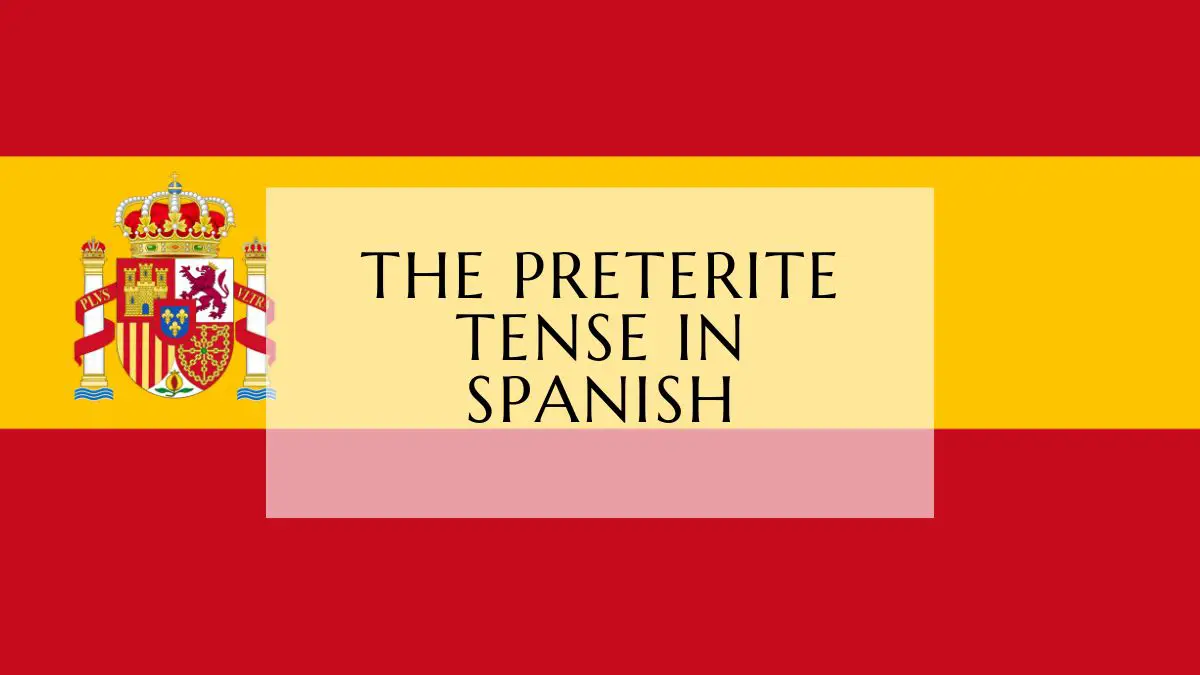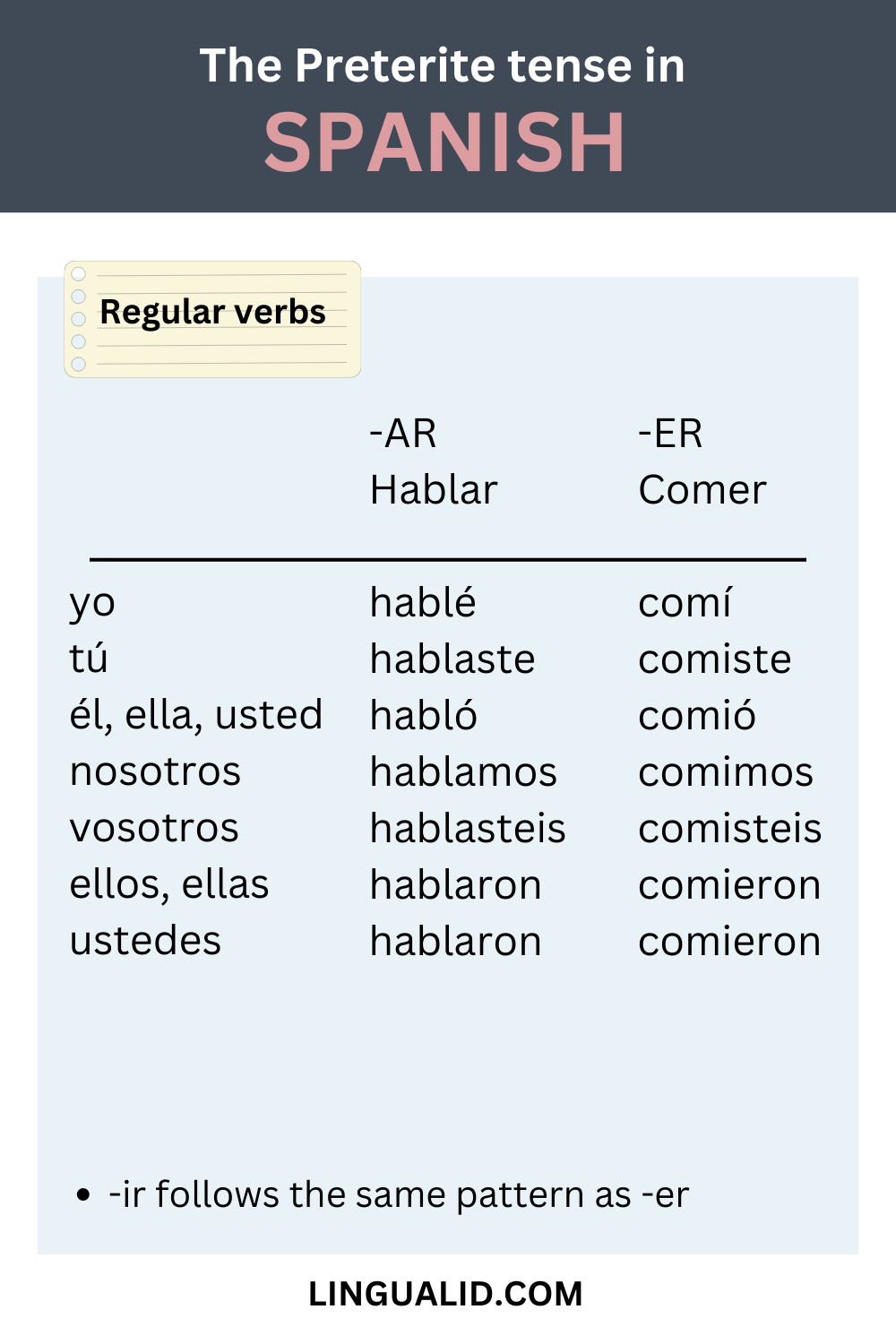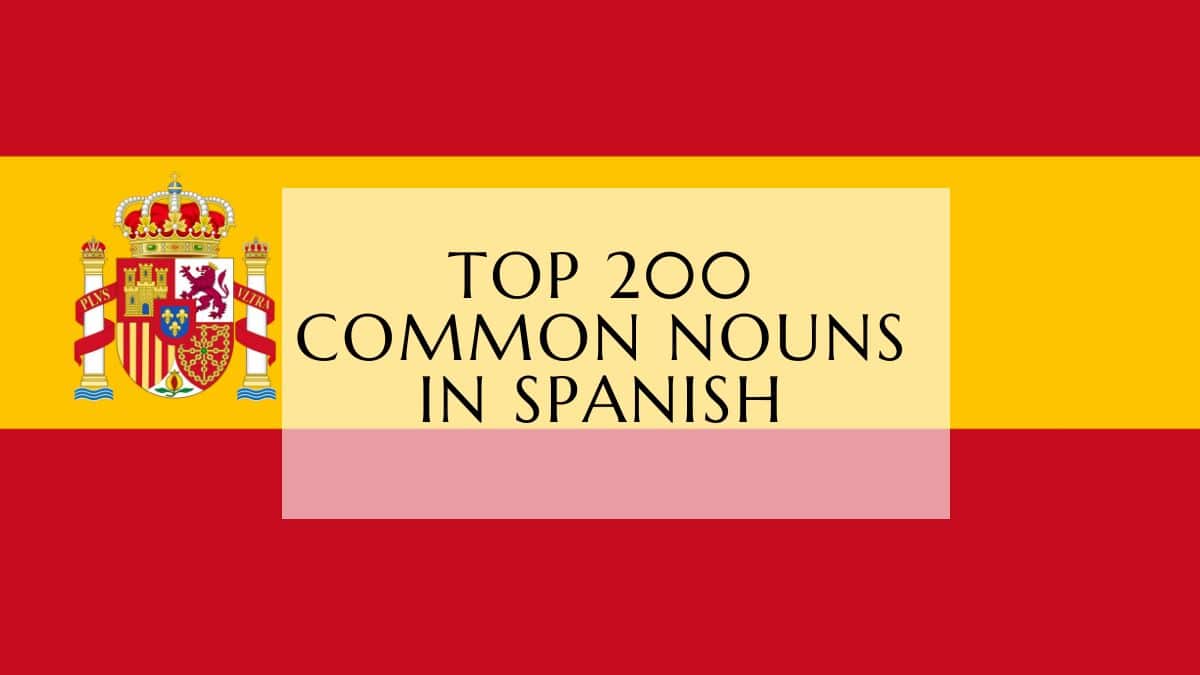The preterite tense in Spanish (El Pretérito Indefinido) is used to express an action in the past that is completed, (in a specific point in the past like yesterday) in this lesson we will talk about the conjugation of each type (-ar, -er and -ir) and give some examples.

Preterite Tense In Spanish
There are three types of endings (like we have seen previously in the present tense lesson) and the regular verbs follow these patterns:
Verbs that end with -ar
| Yo | -é |
| Tú | -aste |
| Él/ ella | -ó |
| Usted | -ó |
| Nosotros / Nosotras | -amos |
| Vosotros / Vosotras | -asteis |
| Ellos / Ellas | -aron |
| Ustedes | -aron |
Example: Estudiar (to study):
| Yo | estudié |
| Tú | estudiaste |
| Él/ ella | estudió |
| Usted | estudió |
| Nosotros / Nosotras | estudiamos |
| Vosotros / Vosotras | estudiasteis |
| Ellos / Ellas | estudiaron |
| Ustedes | estudiaron |
Example: Hablar (to speak)
| Yo | hablé |
| Tú | hablaste |
| Él/ ella | habló |
| Usted | habló |
| Nosotros / Nosotras | hablamos |
| Vosotros / Vosotras | hablasteis |
| Ellos / Ellas | hablaron |
| Ustedes | hablaron |
Verbs that end with -er and -ir
| Yo | -í |
| Tú | -iste |
| Él/ ella | -ió |
| Usted | -ió |
| Nosotros / Nosotras | -imos |
| Vosotros / Vosotras | -isteis |
| Ellos / Ellas | -ieron |
| Ustedes | -ieron |
Example: aprender (to learn)
| Yo | aprendí |
| Tú | aprendiste |
| Él/ ella | aprendió |
| Usted | aprendió |
| Nosotros / Nosotras | aprendimos |
| Vosotros / Vosotras | aprendisteis |
| Ellos / Ellas | aprendieron |
| Ustedes | aprendieron |
Example: comer (to eat)
| Yo | comí |
| Tú | comiste |
| Él/ ella | comió |
| Usted | comió |
| Nosotros / Nosotras | comimos |
| Vosotros / Vosotras | comisteis |
| Ellos / Ellas | comieron |
| Ustedes | comieron |
Example: decidir (to decide)
| Yo | decidí |
| Tú | decidiste |
| Él/ ella | decidió |
| Usted | decidió |
| Nosotros / Nosotras | decidimos |
| Vosotros / Vosotras | decidisteis |
| Ellos / Ellas | decidieron |
| Ustedes | decidieron |
Example: partir (to leave)
| Yo | partí |
| Tú | partiste |
| Él/ ella | partió |
| Usted | partió |
| Nosotros / Nosotras | partimos |
| Vosotros / Vosotras | partisteis |
| Ellos / Ellas | partieron |
| Ustedes | partieron |
We normally use time expressions to indicate a specific time when the action took place, like:
Anoche – last night
Ayer – yesterday
La semana pasada – last week
Hace + period of time : hace dos meses ( two months ago)
Note: you can practice what you’ve learned here, and learn how to pronounce each of the words in our Memrise course here, don’t know how to use the platform or sign up? we’ve got you covered in this easy-to-follow tutorial here.
Some irregular verbs:
Ser and ir (to be and to go)
Notice that both have the same conjugation in the preterito indefinido:
| Yo | fui |
| Tú | fuiste |
| Él/ ella | fue |
| Usted | fue |
| Nosotros / Nosotras | fuimos |
| Vosotros / Vosotras | fuisteis |
| Ellos / Ellas | fueron |
| Ustedes | fueron |
Tener (to have)
| Yo | tuve |
| Tú | tuviste |
| Él/ ella | tuvo |
| Usted | tuvo |
| Nosotros / Nosotras | tuvimos |
| Vosotros / Vosotras | tuvisteis |
| Ellos / Ellas | tuvieron |
| Ustedes | tuvieron |
Venir (to come)
| Yo | vine |
| Tú | viniste |
| Él/ ella | vino |
| Usted | vino |
| Nosotros / Nosotras | vinimos |
| Vosotros / Vosotras | vinisteis |
| Ellos / Ellas | vinieron |
| Ustedes | vinieron |
Hacer (to do)
| Yo | hice |
| Tú | hiciste |
| Él/ ella | hizo |
| Usted | hizo |
| Nosotros / Nosotras | hicimos |
| Vosotros / Vosotras | hicisteis |
| Ellos / Ellas | hicieron |
| Ustedes | hicieron |
Estar (to be)
| Yo | estuve |
| Tú | estuviste |
| Él/ ella | estuvo |
| Usted | estuvo |
| Nosotros / Nosotras | estuvimos |
| Vosotros / Vosotras | estuvisteis |
| Ellos / Ellas | estuvieron |
| Ustedes | estuvieron |

Spanish Preterite Tense Review
Questions:
- What is the primary function of the preterite tense in Spanish? Provide an example.
- Explain the difference in conjugation between regular -ar verbs and regular -er/-ir verbs in the preterite tense. Give an example of each.
- List three time expressions commonly used with the preterite tense and provide their English translations.
- Conjugate the verb “hablar” (to speak) in the preterite tense for the following pronouns: Yo, Él/Ella, Ustedes.
- Conjugate the verb “comer” (to eat) in the preterite tense for the following pronouns: Nosotros/Nosotras, Tú, Vosotros/Vosotras.
- The verbs “ser” and “ir” share the same conjugation in the preterite tense. Conjugate “ser/ir” in the preterite tense for the pronoun “Yo.”
- What is irregular about the verb “tener” (to have) in the preterite tense?
- Conjugate the verb “venir” (to come) in the preterite tense for the pronoun “Ellos/Ellas.”
- Provide the preterite tense conjugation of the verb “hacer” (to do/to make) for the pronoun “Usted.”
- What is the preterite tense conjugation of “estar” (to be) for the pronoun “Nosotros/Nosotras”?
Answer Key:
- The preterite tense expresses a completed action in the past. Example: “Yo comí la pizza.” (I ate the pizza).
- -AR verbs have the endings -é, -aste, -ó, -amos, -asteis, -aron. -ER/-IR verbs have the endings -í, -iste, -ió, -imos, -isteis, -ieron. Example: “Yo hablé” (I spoke) vs. “Yo comí” (I ate).
- Anoche (last night), ayer (yesterday), la semana pasada (last week).
- Yo hablé, Él/Ella habló, Ustedes hablaron.
- Nosotros/Nosotras comimos, Tú comiste, Vosotros/Vosotras comisteis.
- Yo fui.
- The stem changes to “tuv-” before adding the preterite endings.
- Ellos/Ellas vinieron.
- Usted hizo.
- Nosotros/Nosotras estuvimos.
Happy learning!
Oualid Cheddadi is the founder of Lingualid, a platform that inspires independent language learners worldwide, regardless of the language they are learning. The name “Lingualid” is derived from the Portuguese word for “language,” “língua,” and the last three letters of Oualid’s name, “Lid.”



